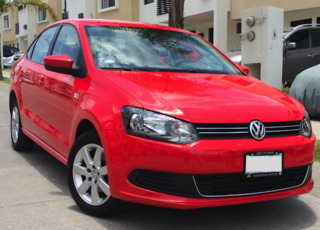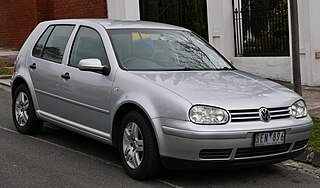
The Volkswagen Golf is a compact car/small family car (C-segment) produced by the German automotive manufacturer Volkswagen since 1974, marketed worldwide across eight generations, in various body configurations and under various nameplates – including as the Volkswagen Rabbit in the United States and Canada, and as the Volkswagen Caribe in Mexico (Mk1).

The Volkswagen Jetta is a compact car/small family car manufactured and marketed by Volkswagen since 1979. Positioned to fill a sedan niche slightly above the firm's Golf hatchback, it has been marketed over seven generations, variously as the Atlantic, Vento, Bora, City Jetta, Jetta City, GLI, Jetta, Clasico, and Sagitar.

The Volkswagen Polo is a supermini car (B-segment) produced by the German car manufacturer Volkswagen since 1975. It is sold in Europe and other markets worldwide in hatchback, saloon, and estate variants throughout its production run. As of 2018, six separate generations of the Polo have been produced, usually identified by a "Series" or "Mark" number.

The SEAT Ibiza is a supermini car that has been manufactured by Spanish car manufacturer SEAT since 1984. It is SEAT's best-selling car. The Ibiza is named after the Spanish island of Ibiza and was the second SEAT model to be named after a Spanish location, after the SEAT Málaga. It was introduced at the 1984 Paris Motor Show as the first car developed by SEAT as an independent company, although it was designed by SEAT in collaboration with well-known firms including Italdesign, Karmann, and Porsche.

The Volkswagen Touareg is a mid-size luxury crossover SUV produced by Volkswagen since 2002. The vehicle is named after the nomadic Tuareg people, inhabitants of the Saharan interior in North Africa. The Touareg was originally developed with the Porsche Cayenne and Audi Q7 and as of October 2020, the Touareg was developed with the Audi Q8, the Bentley Bentayga and the Lamborghini Urus, which shares their MLB Evo platform and chassis. The first generation (2002–2010) offered five, six, eight, ten, and twelve-cylinder engine choices.

The Volkswagen Caddy is a panel van and leisure activity vehicle (M-segment) produced by the German automaker Volkswagen Group since 1980. It is sold in Europe and in other markets around the world. The Volkswagen Caddy was first introduced in North America in 1980 and in Europe in 1982. The first and second generations also had pick-up variants.

The Škoda Fabia is a series of passenger cars produced by Czech manufacturer Škoda Auto since 1999. It is the successor of the Škoda Felicia, which was discontinued in 2001. The Fabia was available in hatchback, estate and saloon body styles at launch, and from 2007, the second generation was offered in hatchback and estate versions. The third generation Fabia was launched in 2015, and the fourth in 2021.

The Volkswagen Vento is a subcompact car produced by the Volkswagen India and Volkswagen Russia subsidiaries of the German manufacturer Volkswagen since 2010. It is essentially a three-box Volkswagen Polo with a stretched wheelbase and has been developed especially for some markets. The car is sold under the Vento nameplate in India, Malaysia, Brunei and Mexico. In Thailand, South Africa, Argentina, Russia, Jordan, Morocco, Algeria, Tunisia and the Middle East, it is sold as the Volkswagen Polo Sedan. The name Vento means 'wind' in both Italian and Portuguese. It is also known as the Volkswagen Polo Notch in the Philippines.
BlueTEC is Mercedes-Benz Group's marketing name for engines equipped with advanced NOx reducing technology for vehicle emissions control in diesel-powered vehicles. The technology in BlueTec vehicles includes a selective catalytic reduction (SCR) system that uses diesel exhaust fluid, and a system of NOx adsorbers the automaker calls DeNOx, which uses an oxidizing catalytic converter and diesel particulate filter combined with other NOx reducing systems.

The Volkswagen Golf Plus is a car that was manufactured by Volkswagen between 2004 and 2014. It has been variously described as a hatchback, a compact multi-purpose vehicle (MPV), or a combination of the two. It was developed as a taller alternative to the Golf hatchback and positioned below the seven-seater Touran in Volkswagen's MPV category. The car is based on the Golf Mk5, rides on the PQ35 platform, and was accompanied by a crossover-styled variant called the Volkswagen CrossGolf in 2006. Throughout its life cycle, it has been sold alongside the Golf Mk5 and the Golf Mk6 for its final two years.

The Volkswagen Polo Mk4 is the fourth generation of the Volkswagen Polo supermini car produced by the German manufacturer Volkswagen. It was marketed from early 2002 to 2010 in most countries except Argentina and the USA. It was manufactured in South Africa until 2017, it was sold as the Polo Vivo. The Mk4 replaced the Volkswagen Polo Mk3, while the Polo Vivo replaced the Citi Golf. In 2018, the Mk4 was replaced by the Volkswagen Polo Mk5 Polo Vivo. In Brazil, It was manufactured until 2014 with a second facelift called 9n4, It was replaced in 2017 by Volkswagen Polo Mk6.

The Volkswagen Polo Mk3 is the third generation of the Volkswagen Polo supermini car and was produced from 1994 until 2002, with a facelift at the end of 1999. It was available in hatchback, sedan and wagon body styles. Although the Polo Mk3 hatchback didn't share the same platform as the Seat Ibiza, saloon and estate models were rebadged as Seat Córdoba.

The Volkswagen Golf Mk5 is a compact car/small family car manufactured and marketed by Volkswagen, as the fifth generation of the Golf in three- or five-door hatchback and a five-door station wagon (2007–2009) configurations, as well as the successor to the Golf Mk4. Using the Volkswagen Group A5 (PQ35) platform, the Mk5 debuted at the Frankfurt Motor Show in October 2003 and went on sale in Europe for the 2004 model year. While marketed as the Volkswagen Rabbit in the United States and Canada, the GTI model in these countries was marketed simply as the Volkswagen GTI.

The Volkswagen Golf Mk4 is a compact car, the fourth generation of the Volkswagen Golf and the successor to the Volkswagen Golf Mk3. Launched in October 1997 for the 1998 model year, it was the best selling car in Europe in 2001.

The Volkswagen Golf Mk6 is a compact car and the sixth generation of the Volkswagen Golf. The Volkswagen Golf Mk6 is the successor to the Volkswagen Golf Mk5 and It was unveiled at the Paris Motor Show in October 2008 for the 2009 model year. Volkswagen released pictures and information on August 6, 2008, prior to the official unveiling. The vehicle was released to the European market in the winter of 2008. Volkswagen claimed investments were made in production efficiency, with a claimed productivity improvement at launch of nearly 20% in comparison with the previous model, with further gains planned for the first twelve months of production. This model year was also a part of the Dieselgate scandal.

The Volkswagen Polo Mk5 is the fifth generation of the Polo, a supermini-class car manufactured by Volkswagen since 2009. The vehicle unveiled at the 2009 Geneva Motor Show in March 2009, while the three-door version was unveiled at the 2009 Frankfurt Motor Show in September 2009. A four-door long-wheelbase sedan version has been produced and sold outside Europe in several emerging markets since 2010 either as the Volkswagen Vento or the Volkswagen Polo sedan. A short-wheelbase sedan version was sold in India between 2016 and 2020 as the Volkswagen Ameo.

The Volkswagen Passat is a front-engine D-segment large family car manufactured and marketed by Volkswagen from 2005 to 2011 (B6) and from 2010 to 2015. Respectively the six and seventh generation Passat, and internally designated B6 and B7, they were marketed in sedan and wagon bodystyles in front-wheel as well as all-wheel drive configurations, with a range of petrol and diesel engines.

Volkswagen R is the brand used by the German auto manufacturer Volkswagen to indicate a sport or high performance model. An "R" badge is placed on the grille, front fenders and trunk of R-model vehicles to indicate the vehicle's trim level.

The Volkswagen Jetta is a compact car, the fifth generation of the Volkswagen Jetta and the successor to the Volkswagen Bora which was manufactured by Volkswagen between 2005 and 2010, and up to 2011 in China. It is a three-box sedan derivative of the Golf Mk5. It was marketed as the Volkswagen Bora in Mexico and Colombia, Volkswagen Vento in Argentina, Chile and Uruguay, and Volkswagen Sagitar in China.





















